A previously healthy 50-year-old man was diagnosed with acute hepatitis after drinking multiple energy drinks daily over a three-week span.

At first the man thought he had the flu; he became alarmed as his symptoms worsened — including signs of jaundice — and he sought medical care.
The man works in construction and told doctors he had been consuming the energy drinks to help him get through his long, labour-intensive work days. He said he wasn’t taking any prescription or over-the-counter drugs, and had no family history of liver diseases.
READ MORE: Energy drinks could lead to dangerous side effects in kids: report
Lab tests showed evidence of hepatitis C infection and a liver biopsy showed “severe acute hepatitis.” The unusual case was profiled in BMJ Case Reports, published Tuesday.
Hepatitis is an inflammation of the liver that can lead to cirrhosis, liver disease and cancer. The virus is often transmitted through blood transfusions, sharing needles or contaminated food. Acute hepatitis can be caused by toxins and is not infectious.
“His liver injury was directly subsequent to excessive consumption of energy drinks, and resolved on discontinuation of the product,” the case study states.
Energy drinks often have a whack of supplements added, including vitamins and stimulants such as caffeine. While these are generally harmless ingredients, large doses can lead to trouble.
READ MORE: U.S. school bans energy drinks because they’re tied to risky behaviour
“Many of these ingredients are present in high concentrations, lending to their risk of accumulation and adverse effects,” the case study states.
Of common energy drink ingredients, B3, also called niacin, is associated with hepatotoxicity, which is drug-induced liver injury.
The drinks the man had consumed each contained 40 mg of niacin; he had been consuming roughly 200 per cent of the recommended daily intake for more than 21 days. His hepatitis was chalked up to his consumption of the “niacin-rich” energy drinks.
There has been one other reported instance of this happening. A 22-year-old woman was diagnosed in 2011 with hepatitis after consuming 10 cans of energy drink every day for two weeks.
READ MORE: Study finds energy drink consumption linked to depression, substance abuse in teens
The woman suffered from stomach pain, nausea, vomiting and jaundice, often evident by a person’s skin and whites of eyes yellowing.
Also in this woman’s case, niacin was speculated to be the “culprit ingredient.”
Authors of the recent case study hope to raise awareness of the risks that can come along with energy drinks.
“By alerting physicians to this phenomenon, we hope patients will be educated about the potential risks of energy drink over-consumption, and thus,
many unnecessary liver injuries will be prevented, or at least promptly identified and treated appropriately.”
EDITOR’S NOTE: This description of the man’s test results and hepatitis has been edited for clarity.




Comments